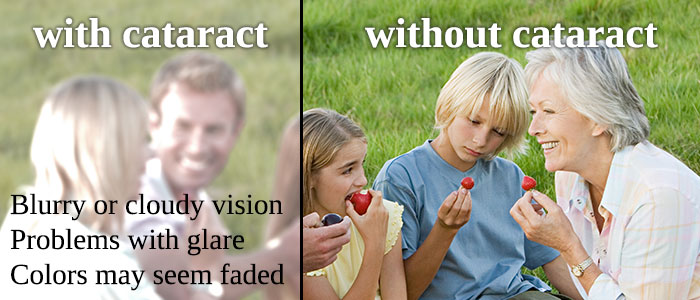
Eye exams, education are important when it comes to knowing about cataracts
Cataracts affect millions of Americans and are a common cause of vision loss as we age.
That’s why it’s important to be aware of cataract symptoms and to have regular eye exams to help diagnose problems and monitor your vision.
Cataracts affect your eyes by causing cloudiness or opacity to the normally clear lenses that focus light to the retina at the back of your eyes. A cataract distorts that light, which can cause blurry vision and make your eyes sensitive to bright lights – especially at night.
The water and protein that make up the lens or each eye can change as you age, with the protein clumping together to cloud the lens. As the cataract grows it becomes harder to see clearly and may require surgery to remove and replace the lens.
Causes of cataracts:
- Aging is the most common cause.
- Diseases such as diabetes or hypertension.
- Exposure to ultraviolet light from the sun.
- Smoking and excessive alcohol use.
- Injury to your eyes.
- Use of steroid medications
- Family history.
Symptoms of cataracts include:
- Blurry or cloudy vision.
- Problems with night vision.
- Glare from the sun, headlights or other light sources.
- Colors may start to seem faded.
- Double vision.
Diagnosis of cataracts:
While it is important to have regular eye exams, you should contact your eye care professional if you notice cataract symptoms. Testing can include:
- Visual acuity testing to determine how well you see at different distances.
- Visual field testing to check your peripheral vision.
- Questions about your vision and medical history.
- Examination of the lenses of your eyes to check for things that indicate a cataract.
Treatment of cataracts:
- The necessity of cataract surgery and the surgery itself is something that should be discussed by you and your eye doctor.
- Cataract surgery is very common and usually is performed without complication on an outpatient basis.
- The lens with the cataract is removed and often replaced with an intraocular lens (IOL), which is implanted in the eye about where your original lens was.
- Your doctor will discuss the recovery period after your surgery with you.
- While the IOL may correct your distance vision, it’s likely you will need reading glasses.
If an IOL can’t be used, your doctor will discuss options with you.
Things you can do to protect your eyes:
There is no scientific proof that you can prevent cataracts, but here are some things experts say can reduce your risk:
- Get regular eye exams. Early detection of eye problems might save your sight.
- Wear polarized sunglasses to protect your eyes from harmful UV rays.
- Quit smoking and limit alcohol consumption.
- Eat healthy, including fruits, vegetables, nuts and fish high in omega-3 fatty acids. These foods provide vitamin C, vitamin E, as wells as lutein and zeaxanthin. Be sure to discuss any diet change with your eye care professional.
- Keep diabetes under control.
It’s important to know how cataracts can affect your vision and even more vital to have regular eye exams to screen for cataracts and other problems that can affect your sight as you age.

